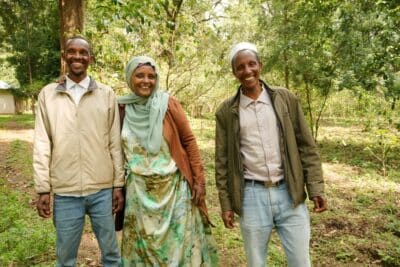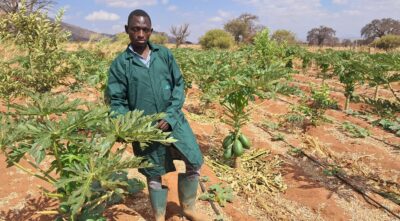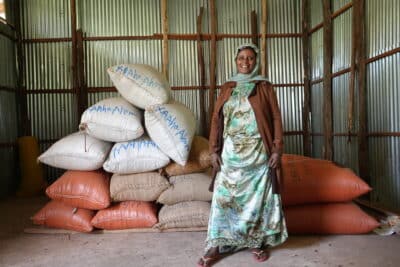Expert view
11 November 2021
Five things I learnt at COP26
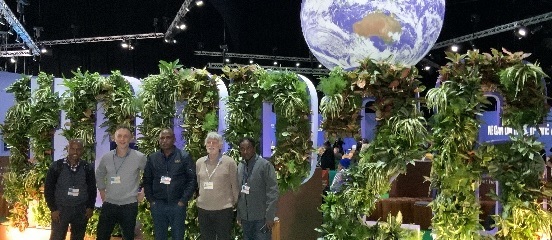
By Dan Collison, Chief Executive, Farm Africa
“Code Red. Code Red to the G7 countries. Code Red. Code Red to the G20. Earth to COP — that’s what it said. Earth to COP. For those who have eyes to see, for those who have ears to listen, and for those who have a heart to feel, 1.5 is what we need to survive.”
The breakout star of COP26 (the 26th meeting of the Conference of Parties to the UN Framework Convention on Climate Change) has been the prime minister of Barbados Mia Mottley, who delivered this impassioned plea laying out the realities of climate change for island nations and vulnerable states in the starkest terms.
Asking for urgent action, she said “we can work with whoever is ready to go, because the train is ready to leave.”
At Farm Africa – we’re on board.
At the end of last week I boarded a train, along with my bike, to head for Glasgow to play my part in representing the hundreds of thousands of farmers Farm Africa supports across eastern Africa in calling for urgent climate action.
Arriving by bike proved to be a good (and environmentally friendly) choice, getting me through road blocks, climate protesters and police cordons. I hadn’t quite bargained for the torrential rain, but it was a timely reminder of the climate extremes the world’s most vulnerable people haven’t bargained for, but now have to contend with.
Farm Africa was well represented at the conference – speaking at, convening and attending meetings from the launch of new biodiversity standard, to panels on nature-based solutions, to online discussions on participatory forest management.
The vast conference halls also provided us with endless opportunities for networking and contact building – from the African Development Bank, to the global climate funds, to an Irish academic working on the ethics of carbon offsets.
On board the train back to London I reflect on my five takeaways from COP26:
1. Farm Africa is more relevant, and more needed, than ever
As the conference negotiators were urged to accelerate ambition and progress towards cutting emissions and tackling climate change, the impact of climate breakdown on the poorest and most marginalised groups was highlighted in all policy announcements and events. Climate change will come for all of us, but it is hitting the poorest earliest and hardest.
Our work is relevant because it deals with both mitigating the effects of climate change, through reducing forest loss, improving soil quality and incentivising communities to manage natural resources sustainably, as well as adapting to change through climate-smart approaches, diversified livelihoods and access to new markets. Working on the intersection between production, markets and environment is the key to helping the world’s poorest farmers face the impact of climate change.

2. Agriculture didn’t feature as a focus of COP26 at policy level, but it should have
Agriculture accounts for up to 30% of global carbon emissions. Nature-based solutions to food production and livelihoods, and adaptive approaches, were the themes of hundreds of side events and discussion groups. I was very proud that Farm Africa’s project work on improved sorghum varieties, regenerative agriculture and farmer-focused natural resource management was cited as practical examples of transforming food systems.
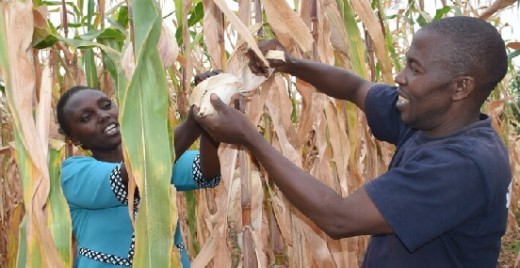
3. Climate finance is attracting billions in investment from governments and private sector, and the market in carbon continues to boom
I joined delegates from across civil society in questioning how these global funds translate into resources for the ‘bankable projects’ of the type that Farm Africa delivers.
We have gained huge respect for the achievements of our payment for ecosystem services work in the Bale Eco-region in Ethiopia – it stands as a model for the sector. But progress on the crucial Article 6 of the Paris Agreements – the bit that regulates trade in carbon has been slow and without it, ensuring that the benefits of carbon offsetting reach the poorest will be difficult.

4. Carbon offsets can’t be used as an alternative to cutting emissions
The fact that the extractive industries combined to have the largest delegation at COP26 is either an indication of intent to support change, or a determined effort to protect interests. Increasing calls for the removal of subsidies and taxation of fossil fuels at the point of production make me think it’s the latter.
5. Most importantly, I’ve been reminded of the skills, experience and dedication of Farm Africa teams and partners
For me, the biggest highlight of COP26 was meeting our REDD+ team, who were here as part of the official Ethiopia delegation.
In the midst of the all the blah blah blah that Greta Thunberg berated the conference for, they are showing what can be done and how to bring change at scale. Thank you Nura, Sahle and Merga for being such formidable ambassadors for Farm Africa. And to Mary, Charles, Ana and Yvan for your brilliant online contributions.
I think that COP26 marks a moment when new levels of anger, fear and anxiety about the future spark new commitment. Whether it keeps global warming to manageable levels – or not – depends on action and Farm Africa is on board to be part of that global effort.
